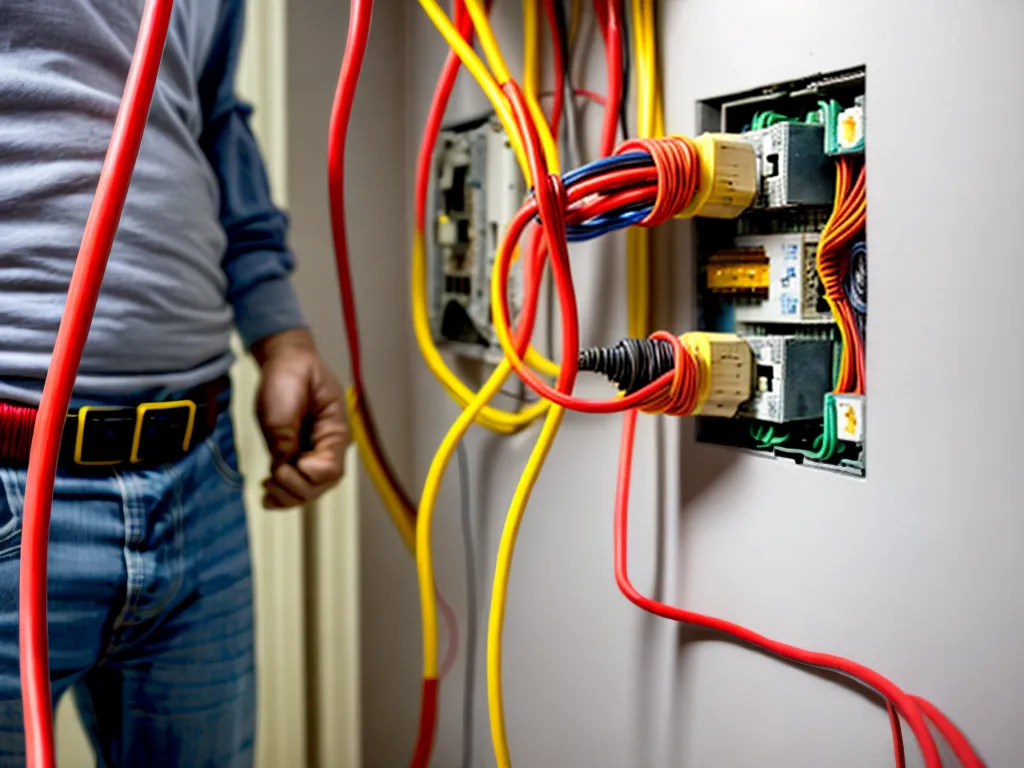
How to Reduce Electrical Hazards in Your Home with Proper Wiring
As a homeowner, it's important to understand the electrical hazards that can exist in your house and how to mitigate them through proper wiring techniques. Taking steps to reduce electrical risks will help protect your family and prevent potential fires or shocks. Here's an in-depth look at how I tackle electrical safety in my home.
Inspect the Electrical Panel and Circuit Breakers
The electrical panel, also known as the breaker box, is the central nervous system of your home's electrical system. It deserves regular inspection and maintenance. Here's what I do:
-
Check for overloaded circuits: If you frequently trip breakers when using certain outlets, it likely means you have too many appliances pulling power from one circuit. This overloads the wiring and creates a fire risk. I consult an electrician to add new circuits.
-
Test ground fault circuit interrupters (GFCIs): GFCIs are essential safety devices, usually found in kitchens, bathrooms and outdoors. I test them monthly by pressing the "test" button to ensure they trip off.
-
Inspect for damage: I check my breaker box for signs of damage like rust, burns, or chipped insulation. Any of these indicate a potential shock or fire hazard. Replacement is needed if damage is found.
-
Label circuits: Having each circuit clearly labeled makes it easier to shut off power when needed. I use a permanent marker to note what each breaker controls.
Replace Outdated or Damaged Wiring
Old wiring that has degraded over decades of use can present serious dangers. Frayed insulation, exposed copper and cracked conduits are red flags. I have a professional electrician inspect my home's wiring and provide upgrades where needed. Replacing old aluminum wiring is a top priority, as it poses high fire risks.
Add GFCIs to Unprotected Areas
GFCIs (ground fault circuit interrupters) instantly break the circuit if electricity starts to flow down an unintended path, protecting against shocks. I've added GFCIs in places like:
- Kitchen counters and small appliance circuits
- Bathroom outlets near sinks or tubs
- Outdoor outlets
- Garage and workshop areas
- Basements
Check for Hot Plugs and Outlets
I periodically inspect electrical outlets and plugs for overheating, which can lead to melted plastic and fire. Signs include:
- Discolored or warped plugs/outlets
- Scorch marks on the outlet
- Buzzing, sizzling or hot smells from an outlet
Any overheating outlet gets replaced right away before a fire can occur. I also avoid overloading outlets with too many appliances.
Upgrade Lighting Fixtures
Lighting fixtures with old or damaged wiring should be upgraded to newer safety standards. I watch for:
- Fixtures lacking a ground wire
- Cracked or fraying wire insulation
- Signs of overheating like discoloration
- Exposed bare wires
Replacing outdated fixtures removes the possibility of shocks or arcs that could ignite a fire.
Avoid Overloading Extension Cords
I minimize the use of extension cords, and never overload them. Too many devices on one extension cord can easily overheat the wiring inside. I check that any needed extension cords are:
- Low gauge (thick wire)
- Grounded 3-prong
- Free of cracks or damage
- Not overloaded beyond their rating
Positioning cords safely to avoid tripping hazards is also essential.
Have Professionals Perform Major Electrical Work
When large electrical issues come up, like rewiring a room or installing new circuits, I always hire a licensed electrician. They have the expertise to complete major jobs safely while ensuring full compliance with electrical codes. Attempting DIY electrical work beyond my skill level puts my home at risk.
Making electrical safety a priority provides vital protection for my home and family. Regular inspections, maintenance and upgrades keep hazards at bay, so I can enjoy peace of mind regarding the electrical system. Taking a proactive approach allows me to identify and correct issues before catastrophe occurs.